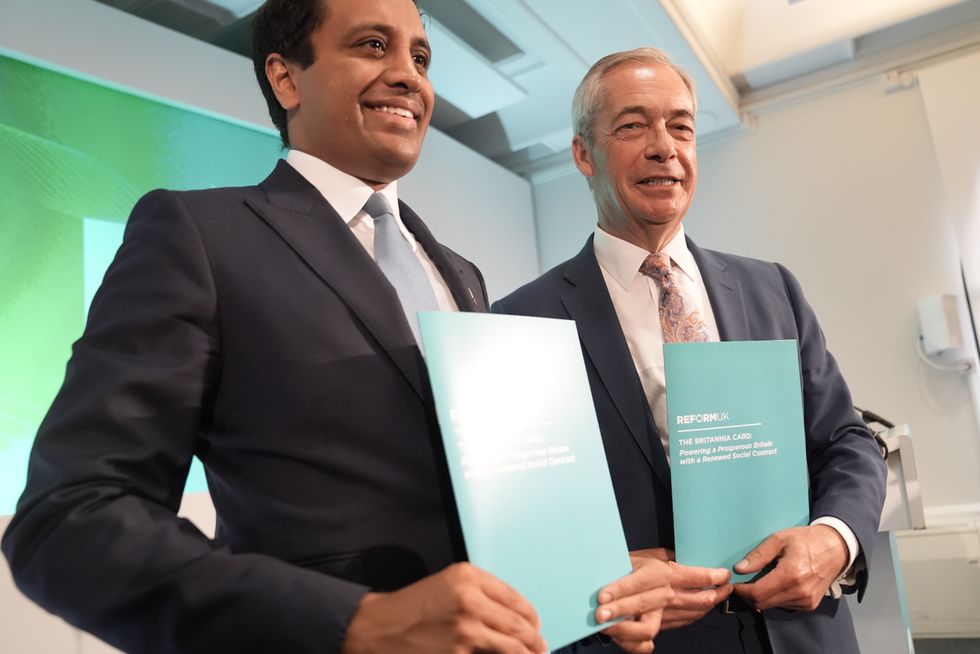Reform faces ‘challenge’ over ‘Britannia card’ plan to entice non-doms back to UK, US financial analyst warns

The financial analyst compared Reform’s ‘gutsy’ policy to Donald Trump's fiscal plans
Don't Miss
Most Read
Latest
Reform UK's 'Britannia card' tax policy faces a "challenge" if it is to be implemented, a veteran financial analyst has told GB News.
Last month, Nigel Farage took aim at Chancellor Rachel Reeves's raid on non-domiciled individuals by launching a new tax policy which would shake up the current system and inspire wealthy individuals back to Britain.
The plan, styled as a “Robin Hood” policy, would see new non-doms pay a one-off £250,00 fee in exchange for a so-called ‘Britannia card’, which would exempt foreigners from paying inheritance tax or capital gains tax.
That flat fee would then be distributed to the lowest-earning 10 per cent of full-time workers as a cash dividend.
Giving his take on the policy, former chairman of the Financial Planning Association, Paul Auslander, told the People’s Channel the plan would be “workable”.
He said: “From an administrative standpoint, it's actually workable because you get the money once and then it's over.
“We in the US floated some policies about taxing folks on their net worth if they reached a certain point, but then the sticking point is, how in the world do you monitor that? You force them every year to do a personal valuation. Like they have to value their corporation? It's not workable.
“So from that sense [Reform’s plan] is workable, but it comes down to the voter.”

Nigel Farage unveiled his 'Robin Hood' tax policy last month
|PA
Based on Reform's low-uptake scenario, which is 6,000 cards a year being handed out, this would generate a £1.5billion a year fund. This would reportedly result in a tax-free annual dividend of £600 per worker. A high uptake scenario of 10,000 cards a year would deliver a £2.5billion annual fund, resulting in a £1,000 a year windfall for each eligible worker, according to Reform's figures.
Auslander continued: “I think it's very helpful for the working class, particularly the class of workers that generally hasn't had a voice.
“Getting them through the hierarchy of voting, I think, is the challenge, even if they're great policies.
“But I like changing up the system a little bit. I can list out the flaws in both of our systems and in a few other countries. And the problem is, most of the politicians don't have the political will to change it.”

Paul Auslander is the former chairman of the US-based Financial Planning Association
|Paul Auslander
Auslander added: “It's not unlike MAGA here. You've got some interesting, good policies that tend not to be listened to because the manner in which they are communicated is so offensive.
“It's not the actual policy. I've said for the longest time that there are certain things Trump's doing that presidents previously just didn't have the guts to do. But then he opens his mouth and kills it.
"So it's that type of thing. You have to combine the ideas. You still have to remember that it's sales 101, right? You have to get people to buy it.”
During the launch of the policy, Farage said: “The driving ambition of Reform UK is to put the lives of everyday British citizens first – and this policy does exactly that.
“We are the party of working people, and we’re building a Britain where wealth and opportunity are shared, not hoarded.”

The 'challenge', according to Auslander, will be getting past voters
|PA
Auslander also told GB News his thoughts on the impact on thousands leaving the UK as a result of Reeves’s tax changes.
Research by the Centre for Economics and Business Research (CEBR) has already warned that the Treasury faces significant financial risks from the non-dom exodus.
The CEBR estimates that if 25 per cent of non-domiciled residents leave the UK, the net gain for the Treasury would be zero. If departures exceed this 25 per cent threshold, the Treasury would begin to lose revenue rather than gain it.
As well as this, the report notes that the Office for Budget Responsibility (OBR) assigned a very high uncertainty rating to their tax revenue costings for the policy.
Auslander said: “I think the impact [of non-doms leaving the UK] can be huge.
“I haven't done a survey, but my guess is that 10 to 12 per cent of new members in my country club in Florida are Brits, and it used to be Germans and Swiss.
“We're seeing more and more Britons come over. And they're wealthy. These are not people who are looking for their next pound. They are in pretty good shape.”
More From GB News











